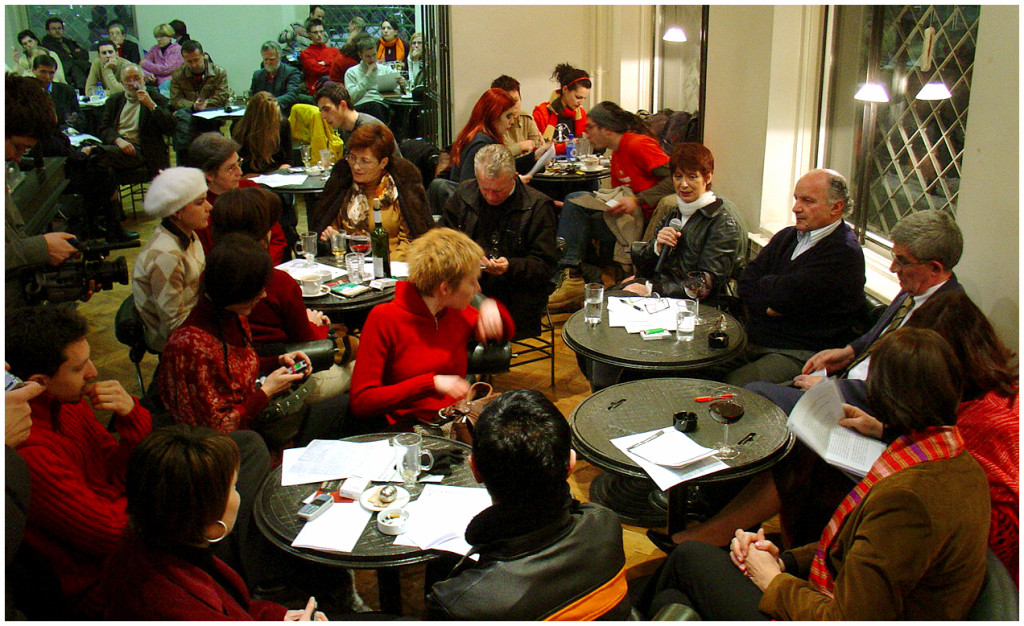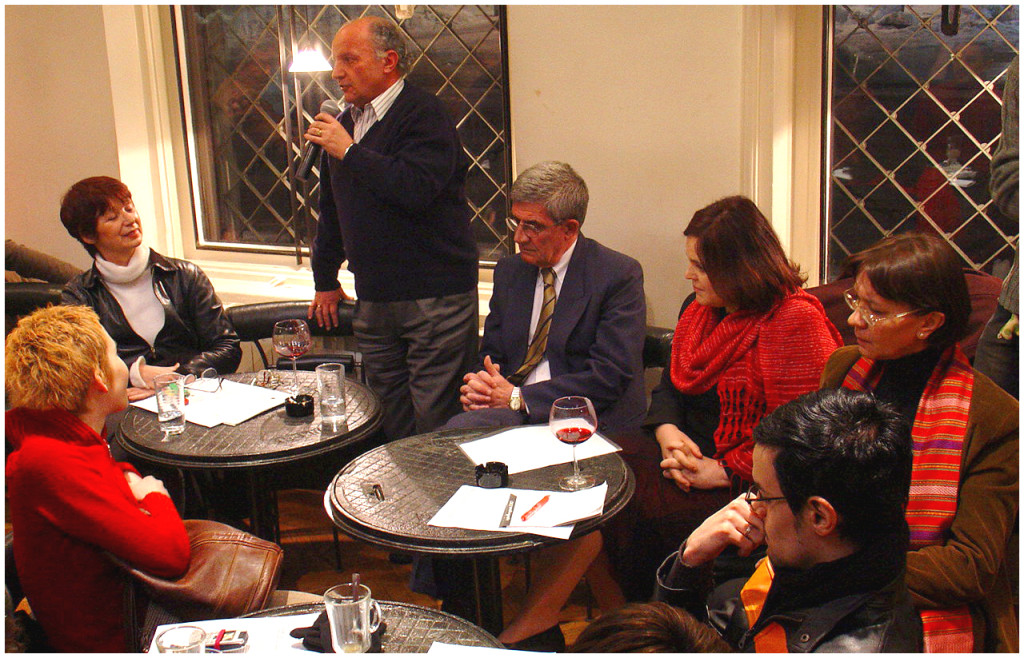Civic forum and Commission
Civic Forum
Civic forum is an informal body composed by representatives of citizens that formulates public interests and launch the public actions and initiatives related to the project (public campaigns, public competition for a new monument).
- Announcement of Public Competition for the NEW MONUMENT.
- Proposition of the competition will be defined by the CIVIC FORUM and by the professional team working on the project. Basis idea of the competition is to leave artist with the freedom to choose the subject of monument that would function as public art.
- Launch a public initiative and campaign “Reconstruction-Everyone to One’s Own”, continuation of the action of return of the busts to the decapitated pedestals, that had been initiated at Sarajevo’s Trg Oslobodjenja by artists Kurt & Plasto with their project “By the Commission’s Decision: Everyone to One’s Own” (2000). There are still other decapitated monuments, or rather pedestal for them at other locations in the city.
- Reinforce the existing initiative for restoration of the monument to Gavrilo Princip as well as to regent Franz Ferdinand and his wife Sophia.
- Initiative for getting a location in the city as a permanent site for Alma Suljevic’s sculpture-installation “Kentauromahija”, as the monument to civic resistance. This public artwork was created during the siege of Sarajevo, made of the waste material found at the Sarajevo Tram Depot, where it is still held among the tram waste, in total neglect. It needs to be conserved, renewed and placed in an appropriate location.
Commission
How did Commission emerge? What is Commission? Why Commission?
The COMMISSION is a public, informal body, a forum of citizens of different professions and generations, and of non-governmental organizations and institutions, led by shared interest and gathered around some open social and cultural issues that require public debates, actions, dialogue with the representatives of authorities as well as cooperation with the media.
The establishment of the COMMISSION was initiated by the project called DE/CONSTRUCTION OF MONUMENT, organized by the SarajevoCenter for Contemporary Art. This project offers an analysis – from different angles, and applying a multidisciplinary approach – of the current “mind-set” in Bosnia and Herzegovina, as well as in other countries of what once used to be Yugoslavia, by way of reading ideological, political or social messages that are conveyed to public in two ways: individual actions, artistic actions and/or art in public space; or else anonymous demolition of monuments from our recent and distant past that most often occurs with a tacit approval, or silence of those who are to be held accountable and who are in charge.
A monument (or public art) is a point of departure, a metaphor or a medium for organized initiation of public debates and campaigns that relate to the (use) of public space in the broadest sense (res publica), as well as to the support to artistic interventions and civic actions in public (urban) space.
The original title “Civic Forum” (as stated in the DE/CONSTRUCTION OF MONUMENT Project) has been changed into COMMISSION, as the sign of continuity with the action entitled „By the Commission’s Decision: Everyone to One’s Own” undertaken by artists from Sarajevo Kurt and Plasto in 2001, and organized by the Sarajevo Center for Contemporary Art. On that occasion an ad hoc COMMISSION was formed – namely, a group of citizens – that decided to re-install the previously demolished and removed monuments to some BiH writers to their original place – the Liberation Square (Trg oslobođenja), although the local authorities did not give their approval for it.
The reasons and motives behind the establishment of COMMISSION are: the policy of silence, the policy of “pushing under the carpet” all the unpleasant and “politically incorrect” phenomena and problems; the non-existence of public opinion, communication and public dialogue between “producers” and “workers” in culture, citizens and their elected representatives; non-existence of democratic mechanisms and transparency in decision-making processes, as well as the absence of clear criteria in the use of funds in different areas; the lack of accountability for various actions and for the failure to take them – all envisaged as an organized pressure of public at large on the executive authorities. The above-mentioned reasons and motives for the civic actions are already present all over Bosnia and Herzegovina; that is why we are proposing to establish COMMISSION in other urban centers besides Sarajevo.
COMMISSION seeks clear answers from the governmental representatives at various levels to publicly posed questions that relate to local and to broader community, particularly those relating culture.
COMMISSION affirms democratic mechanisms of communication between the electorate and the elected, participation of citizens in decision-making processes, as well as participation of professionally qualified individuals whenever it comes to specific, professional issues of public interest.
COMMISSION speaks loudly about the things that the public at large is silent about.
In terms of organization, program and strategy, COMMISSION acts in several directions and at several levels (starting from the place where it was initially formed):
- Initiating public actions (campaigns, polls and surveys, competition for a new monument) in public space related to the DE/CONSTRUCTION OF MONUMENT. Specific tasks related to specific fields are performed by qualified individuals or volunteers;
- Recognizing, formulating and proposing the relevant and current themes for public debate in the domain of culture and social life, in collaboration and coordination with the existing focal points of such activities (debates and panels organized by the groups and organizations in Sarajevo gathered around Media Center, Karabit bookstore &café, or with partner-organizations in other centers of BiH);
- Initiating collaboration, coordination and joint public events and actions relating the existing proposals made by individual institutions that can not be organized without organized public support (Museum of the Assassination of Archduke Ferdinand, and the idea of rebuilding both the demolished monuments related to that historic event);
- Raising public awareness, launching solidarity actions with the institutions and organizations crucial for the country’s culture (ranging from the protection of heritage to the support for new artistic production – i.e. future heritage), whose existence is neglected by both the executive authorities and by the community as the whole, who have both failed to find a systemic solution to ensure the survival of institutions of particular relevance for the history and the culture of the country).
- Providing public support for the initiatives launched by municipal and city authorities that are vital for the quality of life of both the cities and their citizens, which are not carried out due to the obstruction of either the authorities or the corporate/clientistic interests of different political/business groups.
To start with, we are proposing some small, viable actions, or the continuation of those already commenced, in the immediate “neighborhood” (the city center) that are not ideologically or politically neutral and that, for that reason, require public debate. E.g.:
- Competition for a new “monument” published and carried out by an NGO, as the body commissioning it (the SCCA within the DE/CONSTRUCTION OF MONUMENT Project), which should find its place in an urban space to be decided upon by the local authorizes;
- Re-installation of several monuments to writers and cultural figures;
- Conservation and application for the permit to place Alma Suljević’s sculpture “Kentauromahija” – a monument to resistance to aggression by the citizens of Sarajevo, made during the war;
- Initiating a public debate on the VraceMemorialCenter;
- The issue of permanent exhibit in public space of the monuments to the rulers from the previous regimes that are currently kept in the museum depots;
- Raising the issue of whether to keep or to dislocate gifts – i.e. monuments or monumental sculptures that were presented to our cities, Sarajevo and Mostar in particular – whose artistic value is disputable;
- The issue of the new monuments that were created either during or after the war in BiH.
The second set of issues that are directly linked to the quality of urban life are the well-coordinated campaigns and actions such as the bridge over the Miljacka River connecting the Academy of Fine Arts and Radić’s Street, Mak Dizdar’s Quay – Kulin Ban’s Quay. (An example of yet another job that the Municipality, the City and the Sarajevo Canton began yet never completed). The problem could be solved by installing a pontoon bridge – an action that could be “orchestrated and directed” by COMMISSION, until the permanent solution is found by those in charge at the level of the City and of the Sarajevo Canton.
The COMMISSION collects and presents to the public all the (more than welcome) initiatives taken by individuals and groups and it is constantly in search of creative and formal solutions for their presentation and (eventual) realization.
The precondition for efficiency and effectiveness, and, at the same time, the most difficult task before the COMMISSION, is to establish, by top-down pressure exerted, the (missing) link with the competent bodies that would consist of dialogue and collaboration and even of civic disobedience actions. Or, in other words, it seeks to find appropriate methods of bringing out and exposing all the protagonists of civic initiatives, particularly those responsible for the the life of our citizens.

